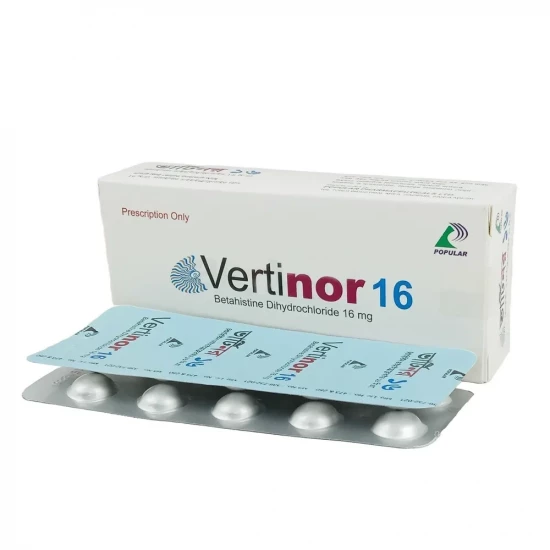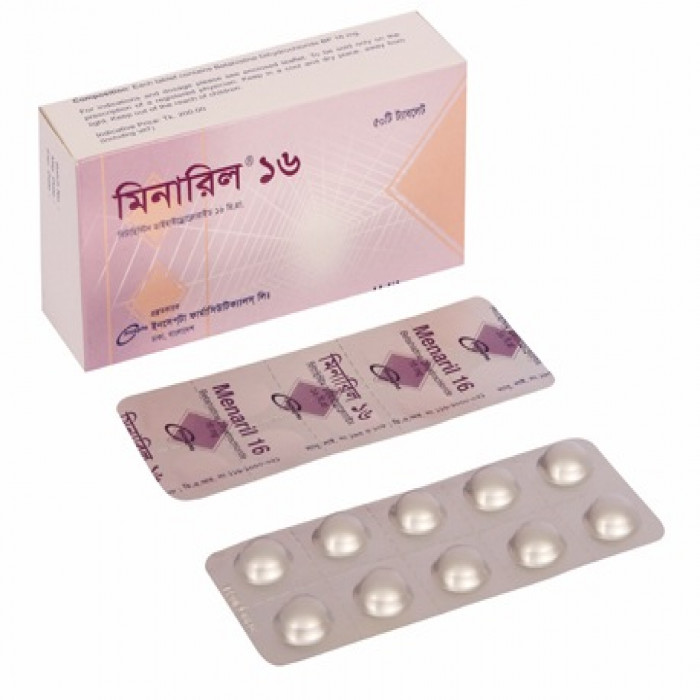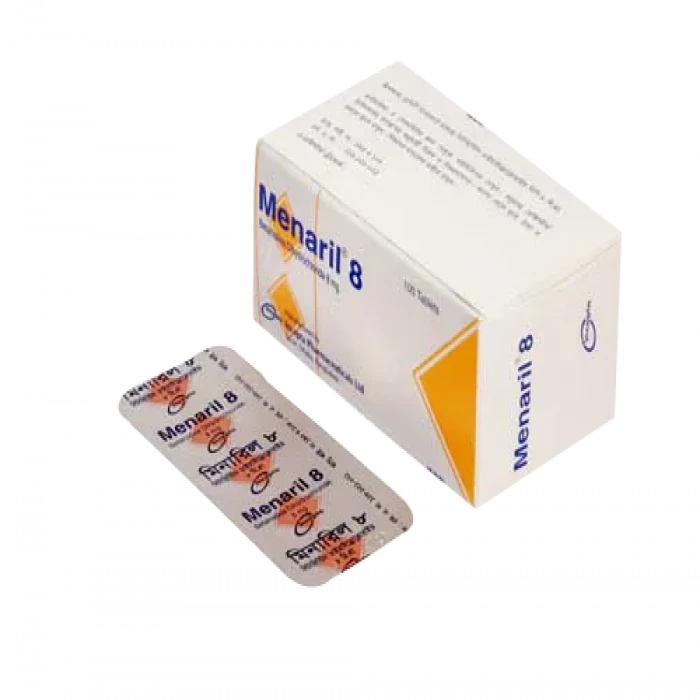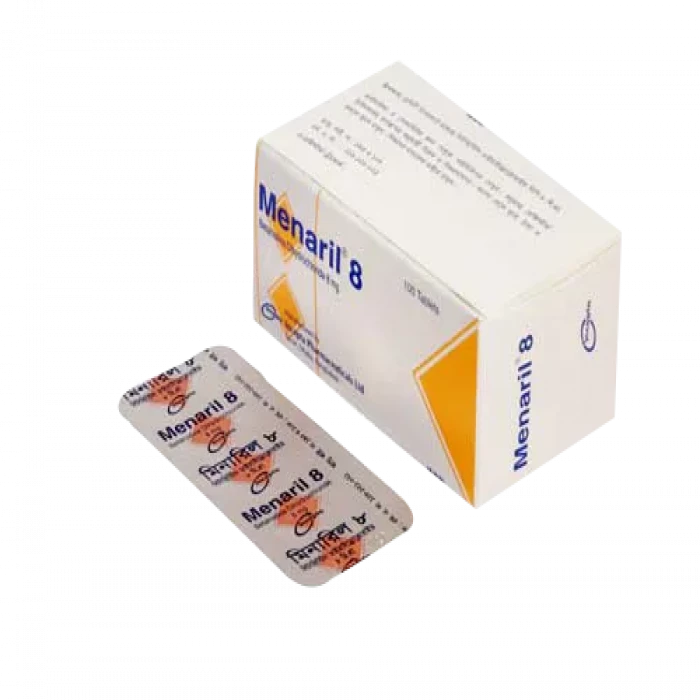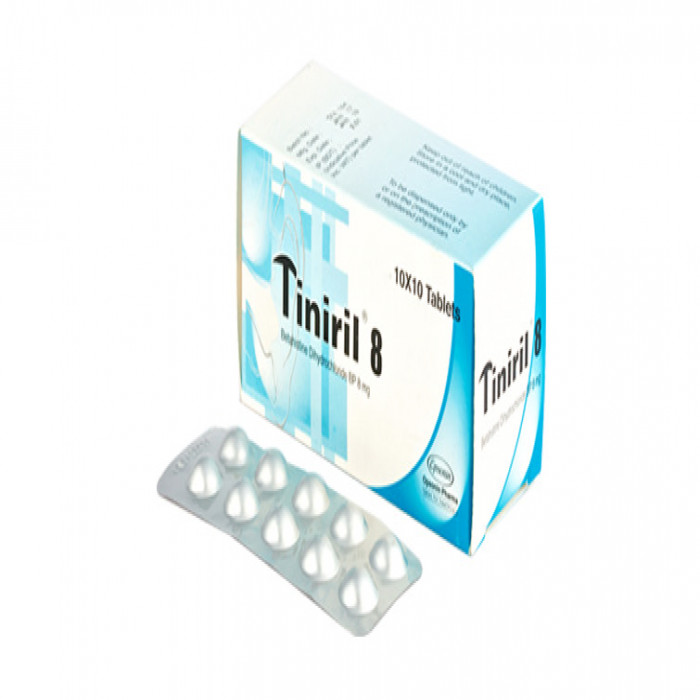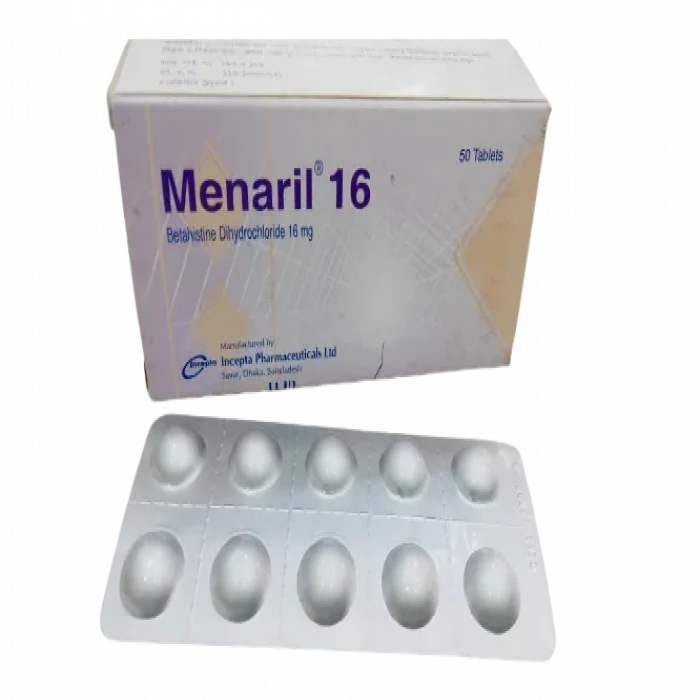
✔ 100% Authentic Product
👁️ Currently Viewing 5692
Menaril 16mg Tablet
Betahistine Dihydrochloride is an antivertigo medicine used in the treatment of Meniere's disease, which is an inner ear disorder. This medicine helps relieve the symptoms of Meniere's disease, such as vertigo (a feeling of dizziness or spinning sensation), ringing in the ears, nausea, and hearing loss. It works by improving blood flow around the inner ear. This will reduce the build-up of pressure in the inner ear.
Discount
Price: ৳ 47
MRP:
৳
50
6%
Off

100% Genuine Products, Guaranteed

Safe & Secure Payments, Always

Fast, Secure & Efficient Delivery

Proper Packaging
 Cash on Delivery - All over Bangladesh
Cash on Delivery - All over Bangladesh Regular Delivery - 12-24 Hours, Dhaka City* Charge Tk.39-59
Regular Delivery - 12-24 Hours, Dhaka City* Charge Tk.39-59 Regular Delivery - 24-48 Hours, Other Cities* Charge Tk.99-110
Regular Delivery - 24-48 Hours, Other Cities* Charge Tk.99-110
 ফ্রি ডেলিভারিঃ - ৯৯৯ টাকা+ অর্ডারে, ঢাকা
শহরে
ফ্রি ডেলিভারিঃ - ৯৯৯ টাকা+ অর্ডারে, ঢাকা
শহরে ফ্রি ডেলিভারিঃ - ২৯৯৯ টাকা+ অর্ডারে, ঢাকার
বাহিরে
ফ্রি ডেলিভারিঃ - ২৯৯৯ টাকা+ অর্ডারে, ঢাকার
বাহিরে
100% Genuine Products, Guaranteed
Safe & Secure Payments, Always
Fast, Secure & Efficient Delivery
Proper Packaging
 Cash on Delivery - All over Bangladesh
Cash on Delivery - All over Bangladesh Regular Delivery - 12-24 Hours, Dhaka City* Charge Tk.39-59
Regular Delivery - 12-24 Hours, Dhaka City* Charge Tk.39-59 Regular Delivery - 24-48 Hours, Other Cities* Charge Tk.99-110
Regular Delivery - 24-48 Hours, Other Cities* Charge Tk.99-110 ফ্রি ডেলিভারিঃ - ৯৯৯ টাকা+ অর্ডারে, ঢাকা
শহরে
ফ্রি ডেলিভারিঃ - ৯৯৯ টাকা+ অর্ডারে, ঢাকা
শহরে ফ্রি ডেলিভারিঃ - ২৯৯৯ টাকা+ অর্ডারে, ঢাকার
বাহিরে
ফ্রি ডেলিভারিঃ - ২৯৯৯ টাকা+ অর্ডারে, ঢাকার
বাহিরে
✅ Description:
Menaril 16mg Tablet, which contains the active ingredient betahistine. It is indeed categorized as an antihistamine anti-vertigo medication and is primarily used for the treatment of Meniere's disease and its associated symptoms, such as vertigo, tinnitus, nausea, and hearing difficulties.
The mechanism of action of betahistine involves improving blood flow to the affected part of the ear and reducing fluid accumulation in the inner ear. By doing so, it can help alleviate the symptoms of Meniere's disease and reduce the frequency of attacks.
It is important to follow the prescribed dosage and instructions when taking Menaril 16mg Tablet. Some common side effects of this medication include nausea, acid reflux, bloating, mild stomach ache, and headache. These side effects are usually mild and transient, resolving on their own within a few days. However, if they persist or worsen over time, it is recommended to seek medical advice.
Before taking Menaril 16mg Tablet, it is essential to consult with your doctor, especially if you have conditions such as asthma, stomach ulcers, skin rash, or low blood pressure. This medication is not recommended for use in individuals under 18 years of age. Inform your doctor about any other medications, herbal or non-herbal products you are using, as they may interact with Menaril 16mg Tablet.
If you are pregnant, breastfeeding, or planning to become pregnant, it is crucial to discuss the use of Menaril 16mg Tablet with your doctor. Additionally, inform your doctor if you have had any previous allergic reactions to betahistine or any other medications.
Overall, it is important to follow the guidance and instructions provided by your healthcare professional and to consult them for personalized advice based on your specific medical condition.
Safety Advices

Alcohol
UNSAFE
Limited information is available on interactions of Menaril 16mg Tablet when taken with alcohol.

Pregnancy
CONSULT YOUR DOCTOR
Due to the lack of relevant safety information, Menaril 16mg Tablet is not recommended for use during pregnancy. Consult your doctor if you are pregnant.

Breastfeeding
CONSULT YOUR DOCTOR
Menaril 16mg Tablet is not recommended for use in breastfeeding women unless considered necessary by the physician. Therefore, consult your doctor before taking it.

Driving
UNSAFE
Taking Menaril 16mg Tablet affects a person's ability to drive so one should avoid driving.

Kidney
CAUTION
Menaril 16mg Tablet is to be taken with caution, especially if you have a history of Kidney diseases/conditions. The dose may have to be adjusted by your doctor.

Liver
CAUTION
Menaril 16mg Tablet is to be taken with caution, especially if you have a history of Liver diseases/conditions. The dose may have to be adjusted by your doctor.
✔️ Uses of Menaril 16mg Tablet
Treatment of-
- Meniere’s disease
- Vertigo
- Ringing in the ears (tinnitus)
- Loss of hearing and
- Feeling sick (nausea).
✔️ How does Menaril 16mg Tablet work?
Menaril 16mg Tablet works by increasing the blood flow to your brain and by lowering the extra pressure build up in the inner ear. By easing down the symptoms associated with Meniere's disease, this drug helps a person to live their normal life.
✔️ Side Effects of Menaril 16mg Tablet
- Nausea and vomiting
- Headache
- Indigestion
- Bloating
- Skin rash and itching
- Difficulty in breathing
- Abdominal pain
✔️ Quick Suggestions:
- Limit caffeine intake: Avoid or limit the consumption of caffeine-containing beverages like tea, soda, coffee, and energy drinks, as caffeine can stimulate the nervous system and potentially worsen tinnitus.
- Maintain regular eating patterns: Do not stay without eating for more than 4 hours. Consistently spacing out meals throughout the day can help stabilize blood sugar levels and potentially reduce symptoms.
- Limit alcohol consumption: Alcohol intake should be limited, as it may decrease the chances of experiencing migraines, which can be associated with Meniere's disease.
- Get sufficient sleep: Aim for 8 hours of quality sleep per night, as proper sleep helps the body relax and may contribute to better overall well-being.
- Quit smoking: Tobacco and smoking can narrow blood vessels and affect circulation, which may have a negative impact on Meniere's disease symptoms. Quitting smoking is beneficial for your overall health.
- Follow the prescribed medication regimen: Take Menaril 16mg Tablet exactly as prescribed by your doctor, following the recommended dose and duration. Consistency in taking the medication is important for optimal effectiveness.
- Consult with your doctor: Before starting Menaril or any other medication, consult with your doctor, especially if you have any medical conditions, are pregnant or breastfeeding, or are taking other medications. Your doctor can provide personalized guidance based on your specific situation.
- Allergies and discontinuation: Inform your doctor if you are allergic to betahistine or any other ingredients in Menaril tablets. Do not abruptly stop taking Menaril without consulting your doctor, as this may worsen your symptoms.
- Common side effects: Some common side effects of Menaril tablets may include stomach pain, indigestion, and nausea. If these side effects persist or become bothersome, inform your doctor.
- Low sodium diet: Consider consuming low sodium-containing foods, as excessive sodium intake may contribute to fluid retention and potentially worsen symptoms related to the inner ear.
✔️ Indication
An anti-vertigo drug, Menaril 16mg Tablet treats Meniere’s disease (signs including dizziness, vertigo, tinnitus, nausea, and hearing problems)
✔️ Pharmacology
Betahistine has a complex mode of action that involves multiple mechanisms:
- Agonism at histamine H1 receptors: Betahistine acts as an agonist at histamine H1 receptors in the inner ear. This stimulation leads to vasodilation of blood vessels, increased permeability, and a reduction in endolymphatic pressure. By maintaining the equilibrium of endolymphatic fluid, betahistine helps prevent the rupture of the labyrinth, which can contribute to hearing loss associated with Ménière's disease.
- Stimulation of vestibulocochlear blood flow: Betahistine's activation of H1 receptors in the inner ear also enhances blood flow to the vestibulocochlear system. This increased blood flow is thought to contribute to the alleviation of vertigo symptoms.
- Antagonism at histamine H3 receptors: Betahistine acts as an antagonist at histamine H3 receptors. By blocking these receptors, betahistine increases the turnover of histamine from postsynaptic histaminergic nerve receptors. This, in turn, enhances the activity of histamine at H1 receptors. The increased histamine activity, particularly in the brainstem, leads to elevated levels of neurotransmitters such as serotonin. The inhibition of vestibular nuclei activity by serotonin helps restore normal balance and reduces symptoms of vertigo.
✔️ Dosage & Administration of Menaril 16mg Tablet
- The usual initial dose of Menaril is 8 mg to 16 mg taken three times daily, preferably with meals.
- The maintenance dose can go up to 48 mg daily as recommended by your doctor.
- Menaril 16mg Tablet is not recommended for use in children.
- Take Menaril 16mg Tablet as advised by your physician, with or without food.
- Swallow the tablet whole with a glass of water. Do not crush or chew it.
- The correct dose and duration of therapy will be determined by your doctor based on factors such as your age, body weight, and the severity of the disease.
- If you accidentally take more than the prescribed dose of Menaril 16mg Tablet, seek immediate medical attention. Symptoms of overdose may include nausea, sleepiness, stomach pain, rapid heartbeat, low blood pressure, shortness of breath, fluid accumulation in tissues, and seizures.
It's important to follow your doctor's instructions and not exceed the prescribed dose of Menaril. If you have any concerns or experience any adverse effects, consult your doctor for further guidance.
✔️ Interaction
Menaril 16mg Tablet can interact with several medications, including:
- Isocarboxazid: It is an MAO inhibitor, and combining it with Menaril may increase the risk of side effects such as increased blood pressure, headache, or serotonin syndrome.
- Cetirizine and Chlorpheniramine: These are other antihistamines, and taking them together with Menaril may enhance the sedative effects of both medications.
- Salmeterol and Formoterol: These are beta-2 agonists commonly used in the treatment of asthma and chronic obstructive pulmonary disease (COPD). Combining them with Menaril may increase the risk of cardiovascular side effects such as increased heart rate or irregular heartbeat.
- Regarding drug-food interactions, no specific interactions have been reported for Menaril 16mg Tablet. However, it is generally advised to limit alcohol, caffeine, and high-salt diet consumption as they may worsen the symptoms of certain conditions, including Meniere's disease.
It's important to inform your healthcare provider about all the medications you are taking, including over-the-counter drugs and herbal supplements, to avoid potential interactions. They will be able to assess the risks and benefits and provide appropriate guidance for your specific situation.
✔️ Contraindications
Betahistine is not recommended for use in patients with pheochromocytoma or porphyria. Pheochromocytoma is a rare tumor of the adrenal gland that can cause excessive release of adrenaline and noradrenaline, and betahistine can potentially increase the release of these substances, leading to worsening symptoms. Porphyria is a group of rare genetic disorders that affect the production of heme, a component of hemoglobin, and certain medications, including betahistine, may trigger porphyria attacks in susceptible individuals. It's important to inform your healthcare provider about any existing medical conditions, including pheochromocytoma or porphyria, before starting any new medications. They will be able to determine the appropriate treatment options for your specific situation.
✔️ Pregnancy & Lactation
In Pregnancy: Although there is no known teratogenic impact in animals, the safety of Betahistine in human pregnancy has not been fully proven. Before administering Betahistine during pregnancy, it's important to weigh the potential advantages carefully.
Lactation: Betahistine is excreted in similar amounts in the breast milk of nursing mothers as it is in the plasma. The neonate's toxicity at these amounts is unknown.
✔️ Precautions & Warnings
- Porphyria: Menaril 16mg Tablet is not recommended for use in patients with porphyria. Porphyria is a group of rare genetic disorders that affect the production of heme, a component of hemoglobin. The use of betahistine in patients with porphyria may exacerbate the condition.
- Bronchial asthma: Menaril 16mg Tablet should be used with caution in patients with bronchial asthma. This caution is advised due to the potential for betahistine to cause bronchospasm or narrowing of the airways in susceptible individuals with asthma.
- Galactose intolerance: Menaril 16mg Tablet is not recommended for use in individuals with galactose intolerance. Galactose intolerance is a rare genetic disorder where the body is unable to metabolize galactose, a sugar found in lactose-containing foods. Since the tablet may contain lactose, it is important to avoid its use in individuals with galactose intolerance.
- Vertigo, tinnitus, and hearing loss: Menaril 16mg Tablet is commonly used to manage symptoms associated with Ménière's syndrome, including vertigo, tinnitus, and hearing loss. These symptoms can significantly impact a person's ability to drive or operate machinery. It is important to be aware of the potential effects of these symptoms on your ability to perform such activities and exercise caution accordingly.
- Stomach discomfort: Menaril 16mg Tablet may cause mild stomach discomfort as a side effect. Taking the medication with food can help reduce stomach problems. It is advisable to follow the prescribed instructions regarding the timing of the medication with respect to meals.
- Pregnancy and lactation: Pregnant or breastfeeding females should consult with their doctor before taking Menaril 16mg Tablet. The use of this medication during pregnancy or lactation should be evaluated carefully, weighing the potential benefits against any potential risks to the mother and the developing baby.
- Active peptic ulcer: Menaril 16mg Tablet is contraindicated in individuals with an active peptic ulcer. The medication may exacerbate the ulcer or delay its healing.
✔️ Storage Conditions
Keep the temperature below 30°C and away from light and moisture. Keep out of children's reach.
⚠️Disclaimer:
At ePharma, we’re committed to providing accurate and accessible health information. However, all content is intended for informational purposes only and should not replace medical advice from a qualified physician. Please consult your healthcare provider for personalized guidance. We aim to support, not substitute, the doctor-patient relationship.




